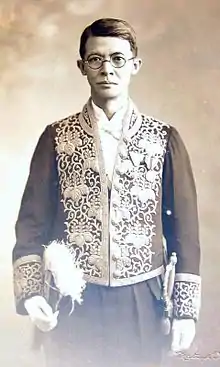Tu Tsung-ming
Tu Tsung-ming (Chinese: 杜聰明; pinyin: Du Congming, Japanese: Tō Sōmē), was the first Doctor of Medical Sciences (equivalent to Ph.D.) of Taiwan. He was born in Tamsui in 1893, trained as a physician at Taiwan Governor's Medical School, and received his doctorate degree from Kyoto Imperial University (now Kyoto University) in 1922. He became the first Taiwanese professor in Japan's pre-1945 imperial university system, at Taihoku Imperial University (now National Taiwan University). His pharmacology research lab was the cradle of medical research in Taiwan. The laboratory did pioneering research on methods to treat opium addiction, on the toxicology of snake venom, and on the pharmacology of traditional Chinese medicine.
Tu Tsung-ming | |
|---|---|
| 杜聰明 | |
 | |
| Born | August 25, 1893 Chi-lân-sam-pó, Tamsui County, Taipeh Prefecture, Taiwan, Chinese Empire (now Tamsui, New Taipei, Taiwan) |
| Died | February 25, 1986 (aged 92) |
| Alma mater | Kyoto Imperial University Taihoku Imperial University |
| Occupation(s) | Pharmacologist, educator |
| Spouse | Tu Lin Shuangsiu 杜林雙隨 |
In addition to participating in pharmacological and toxicological research, Tu also contributed to medical education. After the World War II, he was the first dean of National Taiwan University Medical College. In 1954, Tu founded Kaohsiung Medical College (now Kaohsiung Medical University) and became the first president of the College (1954–1966).